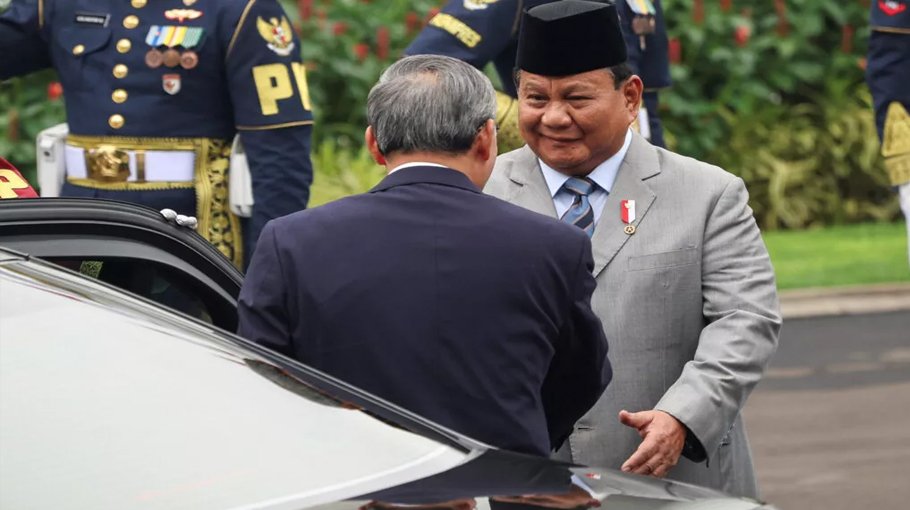Indonesia’s foreign policy is all style, no substance

Virdika Rizky Utama
Six months into his presidency, Indonesian President Prabowo Subianto has undertaken a whirlwind of international activity, including visits to Beijing, Washington, Moscow, Ankara and Cairo. But behind each visit’s elaborate ceremony, high-level meetings and carefully curated media presence lies a profound lack of orientation. Prabowo has yet to articulate what Indonesia stands for in global affairs.
Jakarta has no foreign policy doctrine, strategic grammar or anchoring worldview, resulting in a posture that appears outward-facing but in fact lacks substance.
Prabowo’s diplomatic choices — such as his decision to join BRICS or vague approach to longstanding partnerships like ASEAN — reveal this lack of consistent, coherent foreign policy framework. Despite his rhetoric about taking a more ‘hands-on’ approach, Prabowo has shown little substance in addressing critical geopolitical issues like the Myanmar crisis.
Nowhere is Prabowo’s failure of narrative clearer than in Indonesia’s quiet failure to commemorate the 70th anniversary of the 1955 Bandung Conference.
The Bandung Conference, held from 18–24 April 1955, represented an assertion of moral agency by the formerly colonised world. Indonesia partly led it, bringing together newly independent nations to imagine a global order beyond Cold War binaries and imperial hierarchies. Ignoring this milestone represents a deliberate retreat from the principles that once defined Indonesia’s diplomatic identity. Indonesia’s governing class no longer appears to see global leadership as a function of ideas or responsibility, but of symbolic gestures and political positioning.
Under former president Suharto’s regime, Indonesia’s global ambitions were gradually replaced by a regionally focused foreign policy, primarily revolving around ASEAN. This laid the groundwork for the foreign policy drift that became more pronounced under former president Joko Widodo, who replaced Indonesia’s longstanding commitment to multilateralism with pragmatic bilateralism and a foreign ministry tasked more with economic facilitation than geopolitical positioning.
But Prabowo’s approach is more dangerous. He has decoupled performance from purpose. The strategic imagination that once grounded Indonesia’s global identity has been hollowed out, leaving a diplomacy reduced to event management.
Without a coherent framework, even the most active diplomatic schedule becomes directionless and unsustainable. Seeking to please all sides eventually inspires confidence in none and deprives the country of credibility. Allies and partners need conviction. Without a clearly expressed worldview, Indonesia becomes less a force in shaping the global order and more an object within it.
What is lost in this transition is not only influence but identity. Bandung was Indonesia’s greatest geopolitical contribution, not because it altered the balance of power but because it redefined the meaning of power itself. It demonstrated that through collective imagination and principled diplomacy, postcolonial states could shift the narrative terrain of global politics. It gave Indonesia a legacy that no other Southeast Asian nation could claim, that of both a convener and an idea.
Prabowo’s silence comes at a critical juncture. The Global South is reasserting itself not as a unified bloc but a contested field of emerging visions. Brazil is rebuilding its South–South alliances through environmental diplomacy. India is leveraging its G20 membership to advance institutional reform. China continues to expand its influence under the banner of development cooperation. Even mid-sized players like Turkiye, Vietnam and South Africa are articulating their place in a shifting global order.
But Indonesia offers neither critique nor contribution, participating but no longer leading. Its historical capital is slowly depreciating, reshaping how the world engages with Indonesia. With each missed opportunity, the expectation that it might someday return to leadership quietly fades. When a nation forfeits initiative long enough, it is no longer asked for input.
In a world defined by geopolitical fragmentation, selective adherence to international law, digital imperialism and climate apartheid, the Bandung principles are more relevant than ever. But they require a credible, confident and consistent voice to give them life. Indonesia today seems unsure what to say or whether it wishes to speak at all.
Prabowo’s foreign engagements appear motivated not by strategic alignment but by personal positioning. Prabowo’s approach diverges from the foundational principle of bebas dan aktif (independent and active), a hallmark of Indonesian foreign policy since it was first articulated by the country’s first vice president Mohammad Hatta. Prabowo’s apparent disinterest in upholding this principle suggests a dangerous hollowing out of Indonesia’s foreign policy identity.
The Bandung Conference represented a moment when Indonesia stood for something, offering a vision of world politics that neither capitulated to empire nor mimicked Western modernity. It drew its legitimacy not from force but from the force of ideas. This legacy was Indonesia’s to extend.
This makes Jakarta’s silence so damaging. Indonesia has abandoned a project, undermining the narrative that connected Indonesia’s domestic identity to its global relevance.
Recovering that connection will not be easy and demands political imagination. Foreign policy must be rebuilt as a function of interest and form of authorship.
If Prabowo wants to place Indonesia among the shapers of the 21st century, he must do more than travel the world’s capitals. He must lead with conviction by standing firmly for principles that can guide the future. Indonesia once defined its role through powerful ideas and global leadership. To regain its relevance, Indonesia must recover a voice grounded not in nostalgia but in a purpose-driven vision for the future. When a country forgets what once made it matter, the world forgets with it.
Virdika Rizky Utama is Executive Director of PARA Syndicate and Lecturer at President University, Bekasi, Indonesia.
Source: East Asia Forum



